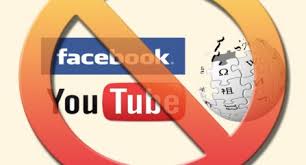
The Pakistani government has increased its efforts to restrict access to content on Facebook that it believes is blasphemous or critical of the state, data released by the social networking website revealed on Tuesday.
The Facebook ‘Government Requests Report’ shows that during the period Jan-June this year, the Pakistani government sent a staggering 1,773 requests to Facebook to restrict content, up almost 10 times from just 162 such requests during the July-Dec period in 2013.

“We restricted access in Pakistan to a number of pieces of content primarily reported by the Pakistan Telecommunication Authority (PTA) and the Ministry of Information Technology under local laws prohibiting blasphemy and criticism of the state,” said Facebook.
Facebook curtails access to pages and posts by users from within Pakistan at the government’s request through a non-transparent agreement with the PTA.
No details of the requests, or specific content restricted were provided by the social networking giant.
Pakistan sent the third largest number of requests globally for content restrictions in the Jan-June 2014 period.
India sent the highest number of such requests – 4,960 – in the first half of this year, with Facebook saying most of them related to “local laws prohibiting criticism of a religion or the state.”
Turkey made 1,893 such requests, the second highest number in the world, under “local laws prohibiting defamation or criticism of Ataturk or the Turkish state”.
In the first half of 2014, the Pakistani government also sent 116 requests for personal data of 160 users or accounts, with Facebook saying it produced data in 35.34 per cent of requests.
Facebook says governments make these requests as part of official investigations, and that the vast majority relate to criminal cases.
“In many of these cases, these government requests seek basic subscriber information, such as name, registration date and length of service. Other requests may also seek IP address logs or account content,” it says.
In the second half of last year, the Pakistani government sent 126 such requests seeking information for 163 users, with 47 per cent requests producing data. Only 35 such requests were sent in the first half of 2013.
“Despite the government's claim that Pakistan is a democratic country, this trend of curtailing freedom of expression is against all democratic and political norms and unacceptable for any democratic society,” says Shahzad Ahmad, Director for Pakistani digital rights group Bytes for All.
Shahzad says digital rights groups in Pakistan are trying to tell the government that censorship is not a solution but a problem in itself.
“We have concrete examples from the past that there have been attempts to block political expression, including that from Balochistan. About two months ago, several pages were blocked which also included Roshni, the page for left-liberal rock band Laal, and others. We saw that there was nothing blasphemous on these pages — they were pages of political expression, against fanaticism and promoting religious harmony.
“Except for Laal, none of these pages ever came back online,” he says.
Reuters adds: Facebook said requests by governments across the world for user information rose by about a quarter in the first half of 2014 over the second half of last year.
In the first six months of 2014, governments around the world made 34,946 requests for data. During the same time, the amount of content restricted because of local laws increased about 19 per cent.
“We're aggressively pursuing an appeal to a higher court to invalidate these sweeping warrants and to force the government to return the data it has seized,” the company said on Tuesday.
Google Inc reported in September a 15 per cent sequential increase in the number of requests in the first half of this year, and a 150 per cent rise in the last five years, from governments around the world to reveal user information in criminal investigations.

No comments:
Post a Comment